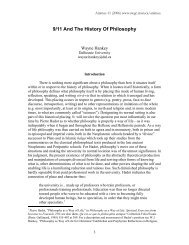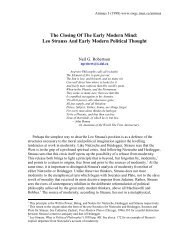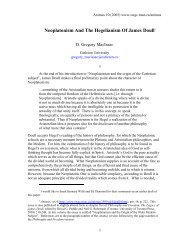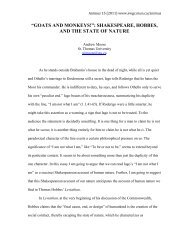HIST2310 COURSE OUTLINE 1 HIST2310 Europe in the ...
HIST2310 COURSE OUTLINE 1 HIST2310 Europe in the ...
HIST2310 COURSE OUTLINE 1 HIST2310 Europe in the ...
Create successful ePaper yourself
Turn your PDF publications into a flip-book with our unique Google optimized e-Paper software.
<strong>HIST2310</strong> <strong>COURSE</strong> <strong>OUTLINE</strong> 1<br />
<strong>HIST2310</strong><br />
<strong>Europe</strong> <strong>in</strong> <strong>the</strong> N<strong>in</strong>eteenth Century, 1789-1914<br />
Historical Studies Program<br />
Grenfell Campus<br />
Memorial University of Newfoundland<br />
W<strong>in</strong>ter Semester, 2012<br />
Course Outl<strong>in</strong>e<br />
Instructor:<br />
Dr. Edw<strong>in</strong> Bezz<strong>in</strong>a<br />
office: Room AS332T (Arts Annex)<br />
e-mail: ebezz<strong>in</strong>a@swgc.mun.ca (I have a policy of respond<strong>in</strong>g to student e-mails<br />
with<strong>in</strong> twenty-four hours, usually sooner)<br />
office phone number: (709) 637-6200 ext. 6152<br />
website: http:www2.swgc.mun.ca/~ebezz<strong>in</strong>a/bezz<strong>in</strong>a_courses.htm<br />
Office hours: Mondays, 10:00a.m.-12:00p.m., 2:00-3:00p.m.; Wednesdays, 10:00a.m.-<br />
1:00p.m.; Thursdays, 10:00-11:00a.m.<br />
Class:<br />
Tuesdays, Thursdays, and Fridays, 2:30-3:20p.m.; room AS383<br />
This course represents a survey of <strong>Europe</strong>an history from <strong>the</strong> outbreak of <strong>the</strong> French<br />
Revolution to <strong>the</strong> eve of <strong>the</strong> First World War. While political history will provide a<br />
chronological framework for <strong>the</strong> course, we will delve also <strong>in</strong>to <strong>in</strong>tellectual history, social<br />
history, cultural history, military history, and women’s history and gender history. Beg<strong>in</strong>n<strong>in</strong>g<br />
with <strong>the</strong> French Revolution is important because <strong>the</strong> memories and <strong>the</strong> hopes surround<strong>in</strong>g that<br />
period of turmoil reverberated throughout <strong>the</strong> n<strong>in</strong>eteenth century <strong>in</strong> so many different forms.<br />
The n<strong>in</strong>eteenth century is <strong>in</strong> many ways a century of paradoxes, of material progress but<br />
sharpened social divisions, of burgeon<strong>in</strong>g nationalism but ris<strong>in</strong>g Anti-Semitism, of new<br />
opportunities for women but Victorian constra<strong>in</strong>ts, and of new and excit<strong>in</strong>g modes of cultural<br />
expression but detrimental imperial ventures overseas. While attach<strong>in</strong>g a label to this period<br />
might be difficult, through this course we will come to understand how modernity and <strong>the</strong><br />
modern world <strong>in</strong> <strong>the</strong> West came to be.<br />
There are five parts <strong>in</strong> this course:<br />
Part One: Revolutionary <strong>Europe</strong>, 1789-1815<br />
Part Two: Reaction, Romanticism, and Industrialism<br />
Part Three: Ideologies, Revolutions, and Social Conflict Around <strong>the</strong> Mid-N<strong>in</strong>eteenth<br />
Century<br />
Part Four: The Modern Nation-State and <strong>Europe</strong>an Imperialism Overseas<br />
Part Five: The Twilight of <strong>the</strong> “Long N<strong>in</strong>eteenth Century”
<strong>HIST2310</strong> <strong>COURSE</strong> <strong>OUTLINE</strong> 2<br />
Goals of <strong>the</strong> Course<br />
i) To develop a knowledge of how to work with historical documents;<br />
ii) To obta<strong>in</strong> a good grasp of how historians work, <strong>the</strong> different types of historical writ<strong>in</strong>g, <strong>the</strong><br />
construction of an argument, <strong>the</strong> use of evidence, and <strong>the</strong> understand<strong>in</strong>g of causation;<br />
iii) To understand a set of <strong>the</strong>mes about <strong>the</strong> history of <strong>Europe</strong> <strong>in</strong> <strong>the</strong> n<strong>in</strong>eteenth century;<br />
iv) To remember a large amount of factual <strong>in</strong>formation, with<strong>in</strong> <strong>the</strong> framework of those <strong>the</strong>mes;<br />
v) To develop <strong>the</strong> ability to construct a coherent argument and present it <strong>in</strong> written and verbal<br />
form.<br />
Please note that <strong>HIST2310</strong> has been designated as a writ<strong>in</strong>g course.<br />
Course Textbooks<br />
Popk<strong>in</strong>, Jeremy D. A Short History of <strong>the</strong> French Revolution. Fifth Edition. Upper Saddle<br />
River, NJ: Pearson/Prentice Hall, 2010.<br />
W<strong>in</strong>ks, Rob<strong>in</strong> W., Joan Neuberger. <strong>Europe</strong> and <strong>the</strong> Mak<strong>in</strong>g of Modernity 1815-1914. New York<br />
and Oxford: Oxford University Press, 2005.<br />
Eaton, John P., Charles A. Haas. Titanic: Dest<strong>in</strong>ation Disaster: The Legend and <strong>the</strong> Reality.<br />
Revised and Expanded Third Edition. Somerset, UK: Haynes Publish<strong>in</strong>g, 2011.<br />
All books are required read<strong>in</strong>g and are available for purchase at <strong>the</strong> Grenfell bookstore.<br />
Course Website<br />
I will be us<strong>in</strong>g <strong>the</strong> course website to post more assignment details, guidel<strong>in</strong>es for <strong>the</strong><br />
read<strong>in</strong>gs, and exam guidel<strong>in</strong>es. The website can be accessed via my webpage. All <strong>the</strong> files are<br />
saved <strong>in</strong> PDF format.
<strong>HIST2310</strong> <strong>COURSE</strong> <strong>OUTLINE</strong> 3<br />
Course Requirements<br />
Course Requirements at a Glance:<br />
value<br />
Due date<br />
class participation 15% n/a<br />
quizzes 5% Thursday, January 19, 2012;<br />
Friday, March 2, 2012<br />
<strong>in</strong>troduction and annotated bibliography for <strong>the</strong> first 5% Thursday, January 26, 2012<br />
essay<br />
first essay 15% Friday, February 17, 2012<br />
proposal and annotated bibliography for research paper 5% Thursday, February 23, 2012<br />
research paper 30% Friday, March 23, 2012<br />
f<strong>in</strong>al exam<br />
25% TBA<br />
Total 100%<br />
Course Requirements <strong>in</strong> Detail:<br />
i) Class Participation<br />
value: 15%<br />
While students are welcome to make comments dur<strong>in</strong>g <strong>the</strong> lectures, <strong>the</strong>re will be specific<br />
classes assigned to discussion. Please come to class with a good grasp of <strong>the</strong> read<strong>in</strong>g. I am open<br />
to a wide variety of perspectives and op<strong>in</strong>ions, so please do not be shy. You do not have to<br />
answer every question asked, but enough to be an active member of <strong>the</strong> class and to work well <strong>in</strong><br />
your discussion groups. I will be us<strong>in</strong>g <strong>the</strong> course website to give students read<strong>in</strong>g guidel<strong>in</strong>es to<br />
provide a sense of what to look for <strong>in</strong> <strong>the</strong> read<strong>in</strong>gs.<br />
ii) Two Quizzes<br />
value: 15% <strong>in</strong> total<br />
dates: Thursday, January 19, 2012; Friday, March 2, 2012<br />
The quizzes will be based on <strong>the</strong> two ma<strong>in</strong> textbooks (Popk<strong>in</strong> and W<strong>in</strong>ks/Neuberger) and for <strong>the</strong><br />
quiz questions I will use <strong>the</strong> questions that I provide <strong>in</strong> <strong>the</strong> read<strong>in</strong>g guidel<strong>in</strong>es for <strong>the</strong> lecture<br />
prior to <strong>the</strong> quiz.<br />
iii) First Essay: Comparative Documents Analysis<br />
details: <strong>in</strong>troduction and annotated bibliography:<br />
length: about 1-2 pages<br />
value: 5%<br />
due date: Thursday, January 26, 2012<br />
essay itself: length: five pages (max. 1,250 words)<br />
value: 15%<br />
due date: Friday, February 17, 2012<br />
This essay <strong>in</strong>volves writ<strong>in</strong>g a comparative analysis of two primary historical documents<br />
that perta<strong>in</strong> to a <strong>the</strong>me <strong>in</strong> this course. Documents can be found onl<strong>in</strong>e by consult<strong>in</strong>g <strong>the</strong> website<br />
suggestions <strong>in</strong> <strong>the</strong> bibliography of <strong>the</strong> W<strong>in</strong>ks and Neuberger textbook. There are also some
<strong>HIST2310</strong> <strong>COURSE</strong> <strong>OUTLINE</strong> 4<br />
document compendiums on reserve at <strong>the</strong> Ferriss Hodgett Library. The best way to understand<br />
<strong>the</strong> documents is to relate <strong>the</strong>m to <strong>the</strong>ir historical context.<br />
Some secondary research is required for this essay (about three secondary sources) <strong>in</strong><br />
order to anchor your understand<strong>in</strong>g of <strong>the</strong> chosen documents <strong>in</strong> <strong>the</strong>ir proper historical context.<br />
For f<strong>in</strong>d<strong>in</strong>g secondary materials, you could start with <strong>the</strong> bibliography found <strong>in</strong> <strong>the</strong> relevant<br />
chapter <strong>in</strong> <strong>the</strong> W<strong>in</strong>ks and Neuberger textbook. Remember, however, that <strong>the</strong> focus is on<br />
analyz<strong>in</strong>g <strong>the</strong> documents; please do not write a research paper. Fur<strong>the</strong>r guidel<strong>in</strong>es and advice<br />
will be distributed <strong>in</strong> class. I would be happy to suggest possible sources. Be sure to avoid <strong>the</strong><br />
use of encyclopedias and general-level textbooks, and be very careful with material found on<br />
websites.<br />
You will notice that this documents analysis requires an <strong>in</strong>troduction and an annotated<br />
bibliography. The <strong>in</strong>troduction should be about three-quarters of a page <strong>in</strong> length. The<br />
<strong>in</strong>troduction will <strong>in</strong>dicate <strong>the</strong> documents chosen, outl<strong>in</strong>e <strong>the</strong> essay’s orientation and approach,<br />
and provide a <strong>the</strong>sis statement as well as a clear idea of <strong>the</strong> essay’s structure. The annotated<br />
bibliography should cite <strong>the</strong> chosen documents as well as two or three secondary sources. The<br />
annotations should <strong>in</strong>clude a very brief description of <strong>the</strong> source’s contents as well as <strong>the</strong> ways <strong>in</strong><br />
which <strong>the</strong> source will contribute to your paper.<br />
The documents analysis must follow proper essay format . I will provide additional<br />
handouts <strong>in</strong> class. Let me stress that I would be more than happy to discuss your topic with you.<br />
I urge you to come see me dur<strong>in</strong>g my office hours or by separate appo<strong>in</strong>tment.<br />
iv) Second Essay: Research Paper<br />
details: proposal and annotated bibliography:<br />
length: 2-3 pages<br />
value: 5%<br />
due date: Thursday, February 23, 2012<br />
essay itself: length: 8-10 pages (2,000-2,500 words max.)<br />
value: 30%<br />
due date: Friday, March 23, 2012<br />
This assignment <strong>in</strong>volves writ<strong>in</strong>g a research paper on a subject that is pert<strong>in</strong>ent to one of<br />
<strong>the</strong> discussion classes. Your bibliography must <strong>in</strong>clude one primary source (be it a letter, an<br />
excerpt from a treatise, a treaty, etc.) and at least seven secondary sources. I can help with<br />
f<strong>in</strong>d<strong>in</strong>g a relevant primary source for your topic.<br />
Each student first must hand <strong>in</strong> a proposal and annotated bibliography. The proposal will<br />
outl<strong>in</strong>e <strong>the</strong> chosen topic and some of <strong>the</strong> <strong>the</strong>mes and arguments that you would like to develop.<br />
The annotated bibliography will list <strong>the</strong> primary source as well as <strong>the</strong> seven secondary sources<br />
(be <strong>the</strong>y books, articles, etc.) that you plan to use, along with about three sentences of details on<br />
each source. These details should <strong>in</strong>clude a very brief description of <strong>the</strong> source’s content as well<br />
as <strong>the</strong> ways <strong>in</strong> which <strong>the</strong> source will contribute to your paper.<br />
The research paper must follow proper essay format (that <strong>in</strong>cludes mak<strong>in</strong>g sure that <strong>the</strong>re<br />
is a <strong>the</strong>sis statement <strong>in</strong> <strong>the</strong> <strong>in</strong>troduction). I will provide additional guidel<strong>in</strong>es <strong>in</strong> class. Let me<br />
stress that I would be more than happy to discuss your topic with you. I urge you to come see<br />
me dur<strong>in</strong>g my office hours or by separate appo<strong>in</strong>tment.
<strong>HIST2310</strong> <strong>COURSE</strong> <strong>OUTLINE</strong> 5<br />
v) F<strong>in</strong>al Exam<br />
value: 25%<br />
date: TBA<br />
Students with diverse learn<strong>in</strong>g styles and needs are more than welcome <strong>in</strong> this course. In<br />
particular, if you have a disability or health consideration that may require special arrangements,<br />
please do not hesitate to let me know. You also should contact <strong>the</strong> Student Services Office as<br />
soon as possible. You may want to make an appo<strong>in</strong>tment with Lorna Payne (637-6268).<br />
Course Schedule<br />
Thursday, January 5, 2012: Introduction to <strong>the</strong> course<br />
Part One: Revolutionary <strong>Europe</strong>, 1789-1815<br />
Friday, January 6, 2012: The Legacy of <strong>the</strong> <strong>Europe</strong>an Enlightenment<br />
Read<strong>in</strong>gs: W<strong>in</strong>ks and Neuberger, <strong>Europe</strong> and <strong>the</strong> Mak<strong>in</strong>g of Modernity, Preface, pp.<br />
xi-xvii<br />
Tuesday, January 10, 2012: Prelude to a Revolution<br />
Read<strong>in</strong>gs: Popk<strong>in</strong>, A Short History of <strong>the</strong> French Revolution, Preface, pp. ix-x; Ch.<br />
1, pp. 1-20<br />
Thursday, January 12, 2012: No Class (I will be away <strong>in</strong> St. John’s to give a paper)<br />
Friday, January 13, 2012: Revolution and <strong>the</strong> Constitutional Experiment<br />
Read<strong>in</strong>gs: Popk<strong>in</strong>, A Short History of <strong>the</strong> French Revolution, Ch. 2, pp. 21-34; Ch. 3,<br />
pp. 35-51<br />
Tuesday, January 17, 2012: Discussion Class<br />
Read<strong>in</strong>gs: review materials from Fri., Jan. 6 th , Tues., Jan. 10 th , and Fri., Jan. 13 th<br />
Thursday, January 19, 2012: The Radical Republic<br />
Read<strong>in</strong>gs: Popk<strong>in</strong>, A Short History of <strong>the</strong> French Revolution, Ch. 4, pp. 52-70<br />
*****first quiz today<br />
Friday, January 20, 2012: The Configuration of <strong>the</strong> French Republic<br />
Read<strong>in</strong>gs: Popk<strong>in</strong>, A Short History of <strong>the</strong> French Revolution, Ch. 5, pp. 71-91; Ch. 6,<br />
pp. 92-106<br />
Tuesday, January 24, 2012: Discussion Class<br />
Read<strong>in</strong>gs: review material from Thurs., Jan. 19 th and Fri., Jan. 20 th
<strong>HIST2310</strong> <strong>COURSE</strong> <strong>OUTLINE</strong> 6<br />
Thursday, January 26, 2012: Napoleonic <strong>Europe</strong><br />
Read<strong>in</strong>gs: Popk<strong>in</strong>, A Short History of <strong>the</strong> French Revolution, Ch. 7, pp. 107-118; Ch.<br />
8, pp. 119-134<br />
*****<strong>in</strong>troduction and annotated bibliography for <strong>the</strong> documents analysis due today<br />
Friday, January 27, 2012: The Legacy<br />
Read<strong>in</strong>gs: Popk<strong>in</strong>, A Short History of <strong>the</strong> French Revolution, Ch. 9, pp. 135-151<br />
W<strong>in</strong>ks and Neuberger, <strong>Europe</strong> and <strong>the</strong> Mak<strong>in</strong>g of Modernity, Introduction,<br />
pp. 1-9<br />
Tuesday, January 31, 2012: Discussion Class: The Contribution of <strong>the</strong> French Revolution to<br />
Modernity<br />
Read<strong>in</strong>gs: review material from Thurs., Jan. 26 th and Fri., Jan. 27 th<br />
Part Two: Reaction, Romanticism, and Industrialism<br />
Thursday, February 2, 2012: The Elusive Search for Stability<br />
Read<strong>in</strong>gs: W<strong>in</strong>ks and Neuberger, <strong>Europe</strong> and <strong>the</strong> Mak<strong>in</strong>g of Modernity, Ch. 1, pp.<br />
11-40<br />
*****start th<strong>in</strong>k<strong>in</strong>g about your research paper and about order<strong>in</strong>g relevant research materials<br />
Friday, February 3, 2012: The Culture of Romanticism<br />
Read<strong>in</strong>gs: W<strong>in</strong>ks and Neuberger, <strong>Europe</strong> and <strong>the</strong> Mak<strong>in</strong>g of Modernity, Ch. 2, pp.<br />
41-63<br />
Tuesday, February 7, 2012: Discussion Class<br />
Read<strong>in</strong>gs: review material from Thurs., Feb. 2 nd and Fri., Feb. 3 rd<br />
Thursday, February 9, 2012: Industrialization Ga<strong>in</strong>s Momentum<br />
Read<strong>in</strong>gs: W<strong>in</strong>ks and Neuberger, <strong>Europe</strong> and <strong>the</strong> Mak<strong>in</strong>g of Modernity, Ch. 3, pp.<br />
64-92<br />
Friday, February 10, 2012: The Metamorphosis of <strong>Europe</strong>an Society<br />
Read<strong>in</strong>gs: W<strong>in</strong>ks and Neuberger, <strong>Europe</strong> and <strong>the</strong> Mak<strong>in</strong>g of Modernity, Ch. 4, pp.<br />
93-124<br />
Tuesday, February 14, 2012: Discussion Class: A General Exploration of Industrialism<br />
Read<strong>in</strong>gs: review material from Thurs., Feb. 9 th and Fri., Feb. 10 th<br />
Thursday, February 16, 2012: Discussion Class: British Industrialism Documents<br />
Read<strong>in</strong>gs Edw<strong>in</strong> Chadwick’s Report on Sanitary Conditions<br />
(http://www.victorianweb.org/history/chadwick2.html)
<strong>HIST2310</strong> <strong>COURSE</strong> <strong>OUTLINE</strong> 7<br />
Part Three: Ideologies, Revolutions, and Social Conflict Around <strong>the</strong> Mid-N<strong>in</strong>eteenth<br />
Century<br />
Friday, February 17, 2012: Ideas about Human Nature, Individualism, and Political Allegiance<br />
Read<strong>in</strong>gs: W<strong>in</strong>ks and Neuberger, <strong>Europe</strong> and <strong>the</strong> Mak<strong>in</strong>g of Modernity, Ch. 5, pp.<br />
125-152<br />
*****documents analysis due today<br />
Tuesday, February 21, 2012: Read<strong>in</strong>g Break (no class)<br />
Have a good break! <br />
Thursday, February 23, 2012: 1848!<br />
Read<strong>in</strong>gs: W<strong>in</strong>ks and Neuberger, <strong>Europe</strong> and <strong>the</strong> Mak<strong>in</strong>g of Modernity, Ch. 6, pp.<br />
153-182<br />
*****proposal and annotated bibliography for research paper due today<br />
Friday, February 24, 2012: Discussion Class<br />
Read<strong>in</strong>gs review materials from Fri., Feb. 17 th and Thurs., Feb. 23 rd<br />
Part Four: The Modern Nation-State and <strong>Europe</strong>an Imperialism Overseas<br />
Tuesday, February 28, 2012: The Gestation of <strong>the</strong> Modern Nation-State<br />
Read<strong>in</strong>gs: W<strong>in</strong>ks and Neuberger, <strong>Europe</strong> and <strong>the</strong> Mak<strong>in</strong>g of Modernity, Ch. 7, pp.<br />
183-228<br />
Thursday, March 1, 2012: Discussion Class<br />
Read<strong>in</strong>gs: review material from Tues., Feb. 28 th<br />
Friday, March 2, 2012: The Golden Age of <strong>the</strong> Bourgeoisie<br />
Read<strong>in</strong>gs: W<strong>in</strong>ks and Neuberger, <strong>Europe</strong> and <strong>the</strong> Mak<strong>in</strong>g of Modernity, Ch. 8, pp.<br />
229-256<br />
*****second quiz today<br />
Tuesday, March 6, 2012: Imperialism<br />
Read<strong>in</strong>gs: W<strong>in</strong>ks and Neuberger, <strong>Europe</strong> and <strong>the</strong> Mak<strong>in</strong>g of Modernity, Ch. 9, pp.<br />
257-288<br />
Thursday, March 8, 2012: Discussion Class:<br />
Read<strong>in</strong>gs review material from Fri., March 2 nd and Tues., March 6 th<br />
Part Five: The Twilight of <strong>the</strong> “Long N<strong>in</strong>eteenth Century”<br />
Friday, March 9, 2012: The Titanic: Historical Background, Part I<br />
Read<strong>in</strong>gs: Eaton and Hayes, Titanic, Introduction, pp. 1-8; Ch. 1, pp. 9-36
<strong>HIST2310</strong> <strong>COURSE</strong> <strong>OUTLINE</strong> 8<br />
Tuesday, March 13, 2012: The Titanic: Historical Background, Part II<br />
Read<strong>in</strong>gs: Eaton and Hayes, Titanic, Ch. 2, pp. 37-52; Ch. 3, pp. 53-66; Ch. 4, pp.<br />
67-74<br />
Thursday, March 15, 2012: Discussion Class<br />
Read<strong>in</strong>gs review material from Fri., March 9 th and Tues., March 13 th<br />
Friday, March 16, 2012: The Titanic: Historical Background, Part III<br />
Read<strong>in</strong>gs: Eaton and Hayes, Titanic, Ch. 5, pp. 75-84; Ch. 6, pp. 85-96<br />
Tuesday, March 20, 2012: The Titanic: Historical Background, Part IV<br />
Read<strong>in</strong>gs: Eaton and Hayes, Titanic, Ch. 7, pp. 97-105; Ch. 8, pp. 106-123; Ch. 9,<br />
pp. 124-139; Ch. 10, pp. 140-156; Ch. 11, pp. 157-177; skim Ch. 12, pp. 178- 208<br />
Thursday, March 22, 2012: Discussion Class<br />
Read<strong>in</strong>gs review material from Fri., March 16 th and Tues., March 20 th<br />
Friday, March 23, 2012: Film<br />
*****research paper due today<br />
Tuesday, March 27, 2012: March<strong>in</strong>g to Modernity<br />
Read<strong>in</strong>gs: W<strong>in</strong>ks and Neuberger, <strong>Europe</strong> and <strong>the</strong> Mak<strong>in</strong>g of Modernity, Ch. 10, pp.<br />
289-318<br />
Thursday, March 29, 2012: Discussion Class: The Women’s Suffragist Movement <strong>in</strong> Great<br />
Brita<strong>in</strong><br />
Read<strong>in</strong>gs: review material from Tues., March 27 th<br />
Consult www.parliament/uk/bus<strong>in</strong>ess/publications/parliamentaryarchives/archives-highlights/archives-<strong>the</strong>-suffragettes/<br />
Friday, March 30, 2012: The Ga<strong>the</strong>r<strong>in</strong>g Storm<br />
Read<strong>in</strong>gs: W<strong>in</strong>ks and Neuberger, <strong>Europe</strong> and <strong>the</strong> Mak<strong>in</strong>g of Modernity, Ch. 11, pp.<br />
319-358<br />
Tuesday, April 3, 2012: Discussion Class:<br />
Read<strong>in</strong>gs: review material from Fri., March 30 th<br />
Thursday, April 5, 2012: Conclusion and Review for <strong>the</strong> F<strong>in</strong>al Exam

















